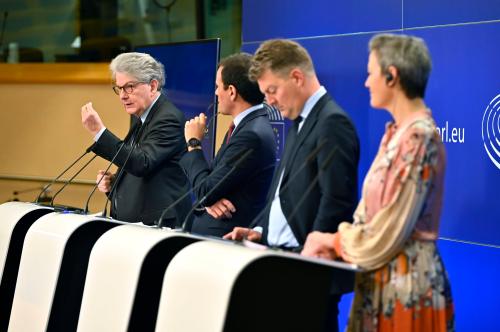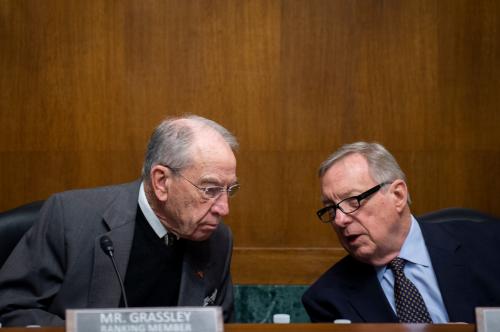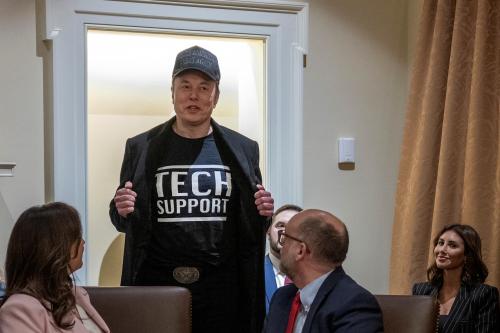“Microsoft president suggests digital regulatory agency” the headline announced. “It’s time to recognize reality,” Brad Smith observed. “The tech sector needs to mature, and we need to lean in to help make a new era of regulation work.”
Smith told the International Association of Privacy Professionals conference on April 13 that the time had come for a focused federal agency to deal with the broad scope of issues created by the major digital platform companies. Taking a very practical approach, he warned it is illogical to ask “a Congress or legislature or parliament to go on a piecemeal basis and change each and every law separately.”
Meta CEO Mark Zuckerberg has also endorsed the idea of a focused federal agency to deal with the new realities created by digital platforms such as his company. Asked at a March 2019 Congressional hearing by Rep. Peter Welch (D-VT) if he would support a new federal agency to regulate platform companies, Zuckerberg responded, “The solution that you’re talking about could be very effective and positive for helping out.” The CEOs of Alphabet and Twitter were asked the same question at the hearing and passed on answering.
Microsoft and Meta are two of the five most valuable digital platform companies in the world; the others are Apple, Alphabet, and Amazon. Hopefully, these other platform companies will also turn their attention from opposing government oversight to helping develop a regulatory structure reflecting the realities of the digital age.
For platform companies, endorsing the concept of a new digital regulatory authority should be an act of enlightened self-interest. The idea that a handful of platforms can continue to make their own behavioral rules even when those decisions harm the public interest is no longer sustainable. The absence of a uniform federal policy is not only not in the interest of the public, but also it is creating problems for these companies. Leaving regulatory decisions to individual states (such as California’s privacy law) and the decisions of other nations (such as the EU’s Digital Markets Act and the United Kingdom’s Digital Markets Unit) creates what business leaders hate the most: uncertainty. The ultimate uncertainty is a set of unknown decisions from multiple regulators. The benefits of the interconnected digital marketplace are threatened if state and/or national governments chop the previously uniform marketplace into smaller, less efficient pieces.
Existing American oversight is constrained at the federal level by out-of-date industrial era statutes and structures. The forward-looking leadership of Lina Khan and Rebecca Slaughter at the Federal Trade Commission (FTC), for instance, is constrained by that agency’s lack of broad rulemaking authority. Their efforts to make old statutes work in a new era will undoubtedly be challenged by industry in the courts, thus further threatening results. The efforts of both the FTC and the Department of Justice to bring antitrust suits against the dominant companies are also important, but fraught with their own set of problems. Unfortunately, such antitrust actions are reliably lengthy, have uncertain outcomes, and have a hard time reaching behavioral concerns such as privacy, misinformation, and marketplace behaviors.
Industrial era policies must be updated to reflect digital era realities. It is necessary to leave behind the kind of rigid micromanagement that characterized industrial regulation in favor of agile risk management that protects consumers and competition while encouraging innovation and investment. It is in this regard that the United States has the opportunity to reassert international policy leadership by advocating a new regulatory paradigm. While the EU and UK have pioneered the need for oversight of the digital platforms, the United States can get back to the international policy table with a new agile regulatory process that will make those efforts more effective in protecting consumers and competition while meaningfully addressing some of the regulatory issues the companies fear.
Creating a new federal agency is the essential vehicle—and the headline grabber. Of potentially greater importance, however, is how that agency will operate. Industrial era regulation was patterned after the management of industrial production: a rules-based bureaucracy. Modern management left that kind of oversight behind years ago in favor of agile management. Digital regulation must follow the same model: flexible and adaptable in order to deal with the rapid pace of technology and marketplace change while simultaneously encouraging innovation and investment.
One of the silliest—and most self-serving—arguments of those who oppose the creation of a new digital agency is that it would end up doing little because it will be captured by those it is supposed to regulate. It is a silly argument because the ultimate do-nothing regulatory capture is the inability to regulate that exists today! The absence of public interest oversight, in fact, is worse than nothing because it means the companies continue to make the rules. That such arguments are often put forward by those who don’t believe in regulation in the first place moves the objection from silly to hypocritical.
That two of the top five digital platform companies agree the time has come for a focused federal regulatory agency is a huge step forward in two significant ways. American consumers deserve protection from the abuses of the dominant digital platforms. At the same time, American digital companies need an open and uniform marketplace that is not chopped up by incompatible regulations. The way to achieve both goals is for the United States to cease hiding from creating a meaningful regulatory structure and reassert both its responsibilities to protect its citizens and to lead the world.
Alphabet, Amazon, Apple, Meta, and Microsoft are general, unrestricted donors to the Brookings Institution. The findings, interpretations, and conclusions posted in this piece are solely those of the author and not influenced by any donation.
The Brookings Institution is committed to quality, independence, and impact.
We are supported by a diverse array of funders. In line with our values and policies, each Brookings publication represents the sole views of its author(s).








Commentary
Time for a new digital regulatory authority
April 15, 2022